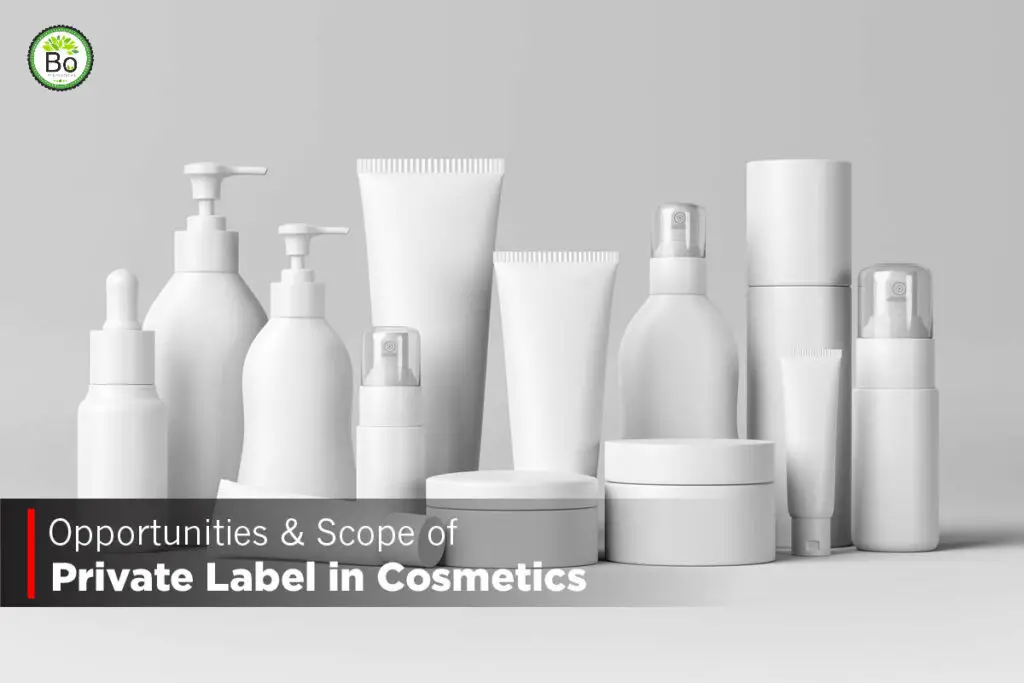Opportunities & Scope of Private Label in Cosmetics

Private label cosmetics refer to beauty and personal care products that are manufactured by one company and sold under another company’s brand name. These products have gained significant traction in the cosmetics industry due to the various opportunities and scope they offer. In this article, we will explore the opportunities and scope of private label cosmetics. Bo International is a renowned global manufacturer specializing in personal care cosmetics, establishing a prominent position in the industry. With a comprehensive range of services including custom formulations, private label cosmetic manufacturing, essential oil production, and natural butter processing, we cater to a diverse array of needs. Entrust us with your specific requirements, and our team will seamlessly handle every aspect, delivering tailored manufacturing and packaging services that align perfectly with your vision.
1. Branding and Customization: Private label cosmetics provide an excellent opportunity for retailers or entrepreneurs to establish their own unique brand identity. With private labels, they can customize the packaging, product formulations, and branding elements such as logos, colors, and labels. This level of customization allows companies to create a distinct brand image that resonates with their target audience.
2. Cost-effectiveness: One of the major advantages of private label cosmetics is their cost-effectiveness. By working with a contract manufacturer, companies can produce high-quality products at a lower cost compared to developing their own manufacturing facilities. This cost advantage enables businesses to offer competitive pricing, which can attract price-conscious consumers.
3. Increased Profit Margins: Private label cosmetics offer higher profit margins compared to reselling established brands. Since private label products are manufactured directly by the retailer or entrepreneur, they eliminate the costs associated with brand licensing or distribution agreements. This enables companies to capture a larger share of the profit generated from the sale of each product.
4. Control over Product Development: Private label cosmetics give companies full control over the product development process. They can work closely with contract manufacturers to create unique formulations, choose specific ingredients, and ensure that products meet their desired quality standards. This control allows businesses to develop differentiated products that cater to specific customer preferences.
5. Flexibility and Agility: Private label cosmetics provide flexibility and agility in the rapidly evolving beauty industry. Retailers can quickly respond to emerging trends, customer demands, and market preferences by introducing new products under their private label. This agility helps companies stay ahead of the competition and capitalize on emerging opportunities.
6. Brand Loyalty and Customer Engagement: By offering private label cosmetics, companies can build brand loyalty and engage with customers on a deeper level. Customers often perceive private label brands as offering value and exclusivity, leading to a stronger connection with the brand. Through effective marketing strategies and product quality, private label brands can foster long-term relationships with customers.
7. Market Differentiation: Private label cosmetics allow companies to differentiate themselves in a crowded marketplace. By developing unique formulations or targeting specific niche markets, businesses can stand out from mass-market brands. This differentiation helps in attracting a specific customer base and building a loyal following.
8. Diversification and Expansion: Private label cosmetics provide an opportunity for retailers or entrepreneurs to diversify their product offerings and expand their business. By introducing new beauty and personal care products, companies can tap into different segments of the market and cater to a wider range of customer needs. This diversification can help drive growth and increase market share.
9. Global Market Reach: Private label cosmetics offer scope for international expansion. As the beauty industry continues to expand globally, companies can leverage private label to enter new markets. By partnering with contract manufacturers or distributors in different regions, businesses can adapt their private label products to meet local preferences and regulations, allowing them to reach a global customer base.
10. Sustainability and Clean Beauty: Private label cosmetics also provide opportunities for companies to address the growing demand for sustainable and clean beauty products. By developing eco-friendly packaging, using natural or organic ingredients, and adhering to sustainable manufacturing practices, businesses can position their private label brands as environmentally conscious and cater to the increasing consumer interest in sustainable beauty.
In conclusion, private label cosmetics offer a wide range of opportunities and scope in the cosmetics industry. They provide avenues for branding, customization, cost-effectiveness, and control over product development. With the ability to differentiate and diversify, private label cosmetics can help businesses expand their market reach, drive







